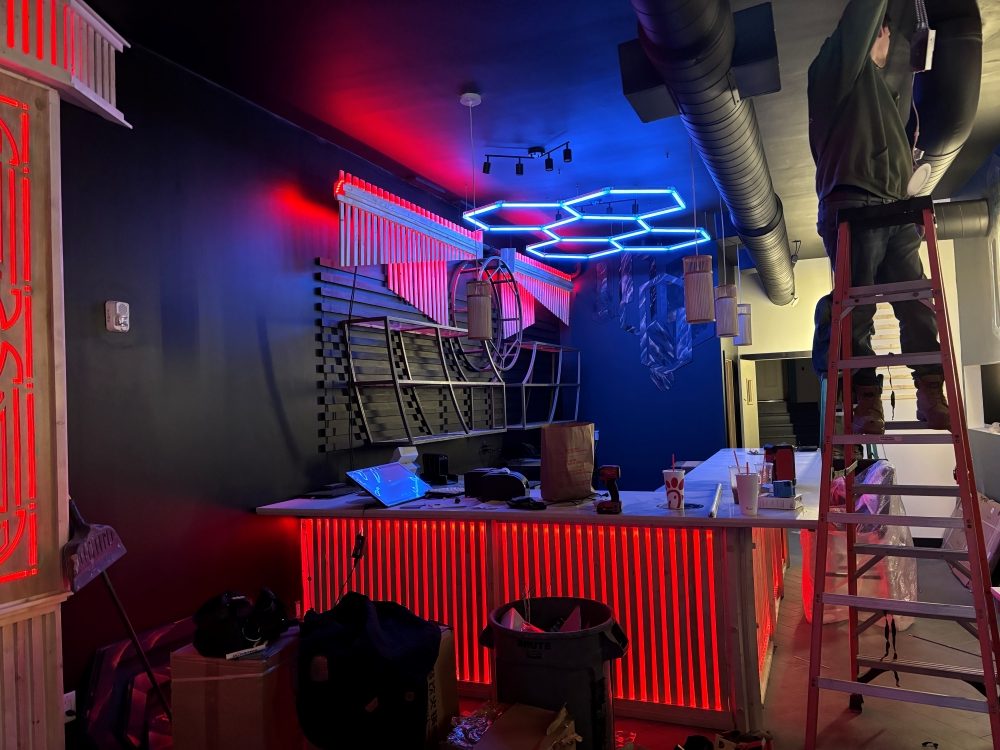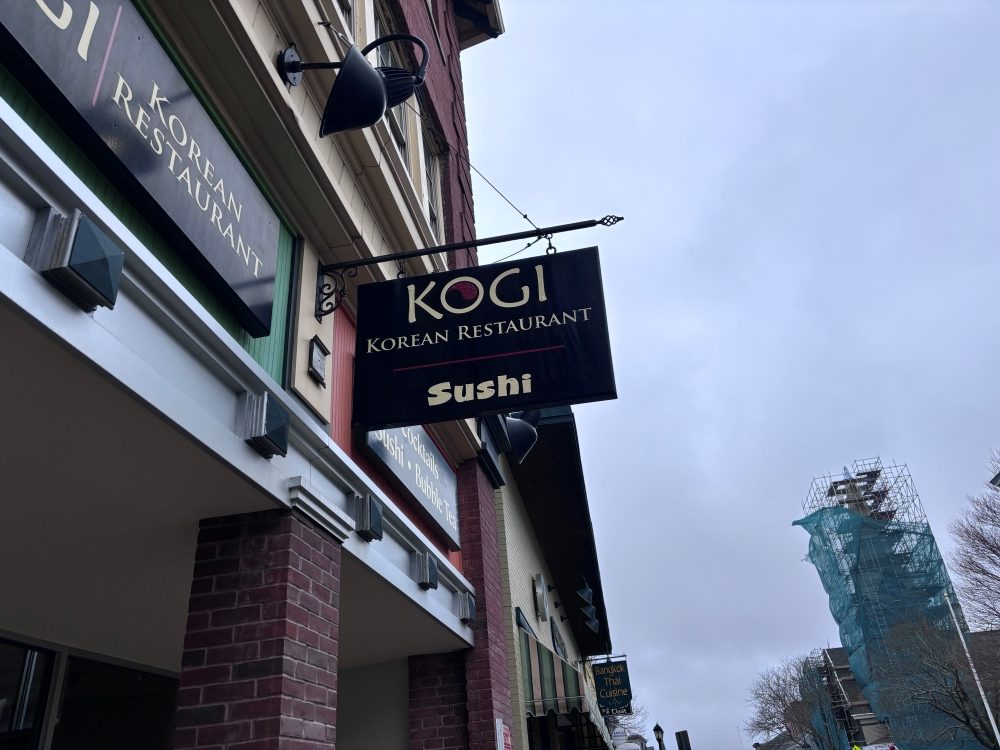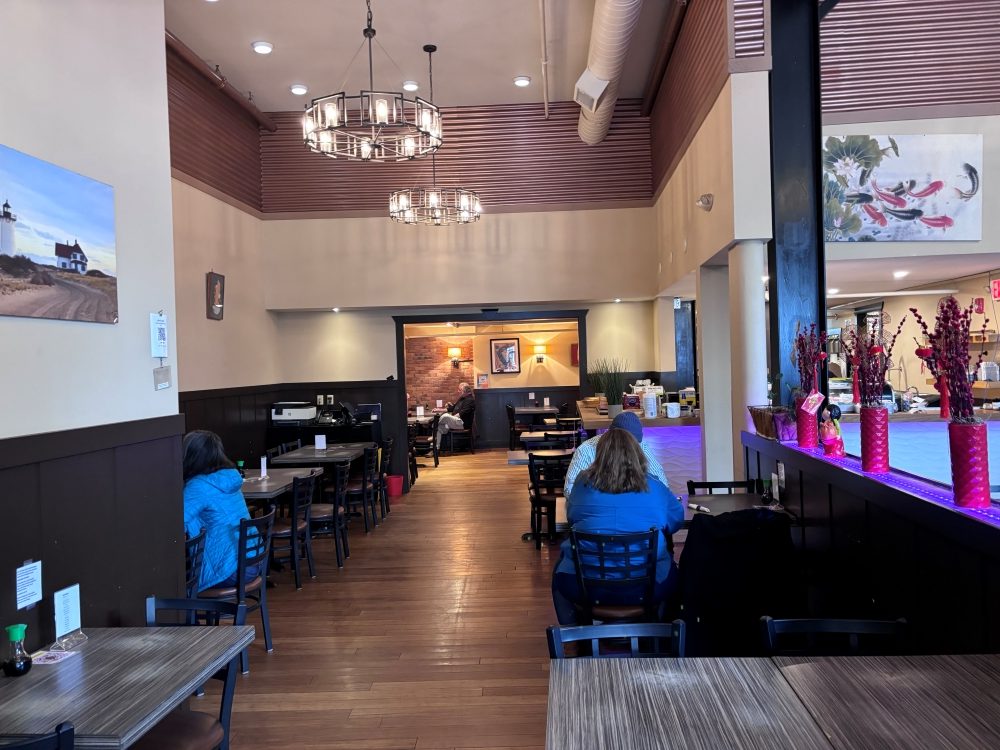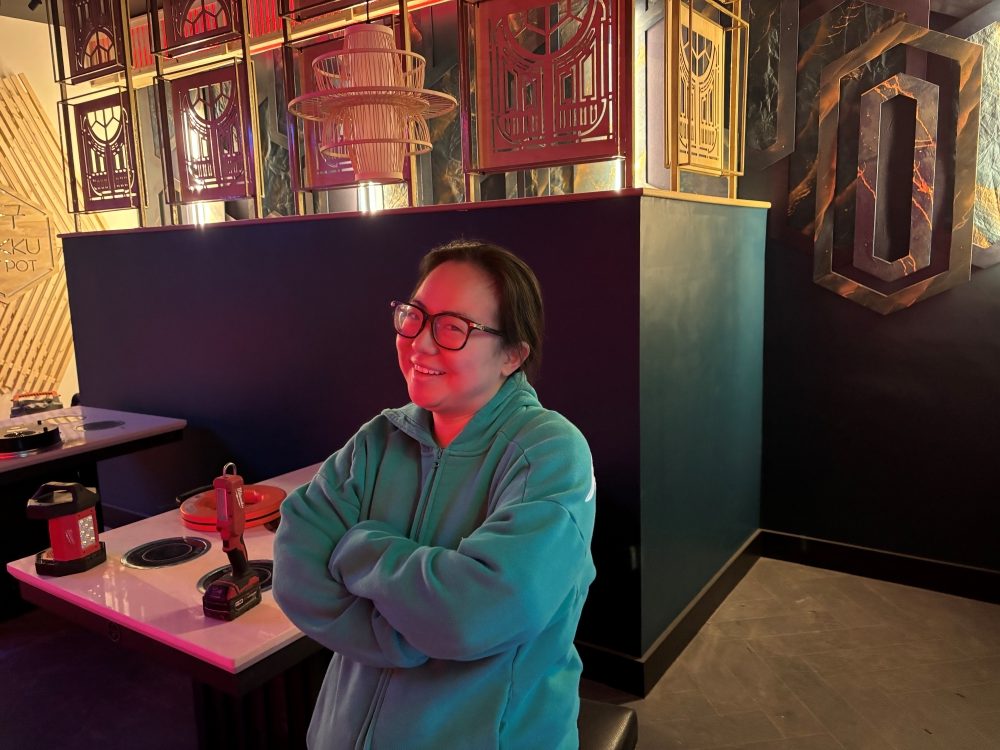Patty Cho is in between jobs. Not that she’s unemployed. Hardly. It’s early afternoon on a spring Tuesday and Cho is making the walk from her Kogi Bar and Grill to Shikku Hot Pot, the restaurant she and her husband, Thuyet Phan, are scrambling to open in May. It’s a few doors away at 18 Court St.
But that’s not all they’re up to. If things go according to plan, by year’s end Kogi will move across the street to the space last occupied by Roll Street Tavern, where they hope to add hibachi-style cuisine to the Kogi roster.
Cho and Phan are young restaurateurs – but not exactly by design, as she’ll explain. Between the never-ending demands of running a restaurant and building out a second one, along with raising a family (they have two children), it’s a grind of a lifestyle. Especially for a self-described micro-manager like Cho. And then there was Covid – it changed just about everything the couple thought they knew about running a restaurant.
Still, Kogi is thriving after nine years – against the odds. Nationwide, about 60 percent of restaurants close within a year, and 80 percent go under within five. Post-pandemic, things are even worse. Blame it on rising food expenses, a shrinking workforce, and higher labor costs associated with those employees who stuck around. Even a casual observer can see that the industry’s business model is fractured. Many restaurants, including those in Plymouth, have responded to the economic pressures of inflation by repeatedly increasing prices. Portions have shrunk. Drink pours can seem stingy. Some restaurants have done away with full time bartenders, dropped lunch service, and made other concessions to stay afloat. But cutting back while charging more is not a viable long-term strategy. A large swath of people can no longer afford to eat out on a regular basis. When a pizza approaches $25 and draft beer costs $12 or more – as is the case at some local establishments – staying home becomes the norm and eating out is a special occasion. That’s a recipe for disaster if you’re operating a restaurant.
Kogi, though, is a reasonably priced Plymouth fixture, bringing Korean food to a downtown that is becoming a destination for authentic Asian cuisine – food that is more adventurous and typically healthier than the chicken fingers and sweet and sour sauce-laced dishes that used to be the only options in town.
Its affordability is one of the reasons why so many younger people are attracted to it. A dinner for two – maybe some sushi, ramen, and bibimbap – won’t break the bank. Date night at Kogi doesn’t require getting a side gig.
I sat down with Cho, 37, inside Shikku Hot Pot, as a construction crew worked around us under a blanket of ever-changing multi-colored lights. It’s shaping up into a beautiful, intimate space that, like Kogi, will bring new flavors to the business district – fitting for the new Plymouth.
Based on her admitted penchant for control, I thought Cho might be a somewhat circumspect interview subject. As you’ll read, I was wrong.
You’ve been here nine years, which is kind of amazing. What was it like starting out?
When we first opened, I was like, “Oh, my God, we need to sell, we need to leave, because I’m done with this!”
That’s not the answer I was expecting.
It was so bad in the beginning that my husband and I actually contemplated getting a divorce. The restaurant, it consumes you.
Other restaurateurs I talk to say similar things, especially if it’s a family business.
There’s always the “I’m right, you’re wrong” type of thing. But it never escalates to the point where we really want to kill each other. Usually, it’s over staff, that’s what we’re arguing about.
It seems like you’ve got a good core crew now.
Yeah, I have great people that work for me. But there’s a difference between an employee mindset and an employer. It doesn’t matter what industry you go into, there’s always going to be that mindset. They don’t have the same investment.
At Kogi’s soft opening you were turning away people. I thought it was smart to limit the number of customers that night when you were just getting your footing.
I remember that to this day. Whoever installed our [kitchen exhaust] hood and the ancillary system messed up. It screwed everything up. All our lights went off. We didn’t know how to turn them back on and it took us a while.

You had no prior restaurant experience? What were you doing before the Kogi adventure?
I was attending law school at Suffolk [University]. I was commuting from Dennis to Boston.
Are you from this area?
No, I’m from New York City. My husband was born and raised in California, but his family moved when he was 12. He’s been on the Cape his whole life after that. His family is still there, for the most part. My first year of law school, we lived with his parents, but my parents were having arguments to the point where they decided to get a divorce.
Were they born in America?
My dad’s from Korea, but my mom’s backstory is more complicated. She was born and raised in Korea but got adopted by an Italian family in New York with her two biological brothers. The youngest brother went first, then the second youngest, and then her. They even had to change the adoption age because of her. She was 15 or 16 and, I guess, past the adoption age but they wanted all three to be kept together. My mother met my father in New York City and they married in 1986.
Years later, it got pretty bad in New York. My dad said, “Let’s get a divorce.” They did that every so often. But it got to the point where we were all fed up and my mom was like, “You know what? I’m going to call you on your bluff.” So they got a divorce [around 2012], but it was really ugly and it consumed me, too, even though I wasn’t there.
Where were you?
I was living on the Cape and working because I had to support myself. They were still in New York. I wasn’t married to Thuyet at the time, but he said, “Hey, what’s your mom going to do now?” She got a settlement from the divorce, so he said, “Why don’t we open a restaurant?” I told him, “We have no restaurant experience. I’m going to law school. You’re going to school for whatever you’re doing. I don’t think that’s a great idea. He thought it was. “We need good Asian food,” he said. “There’s nothing on the Cape and your mom’s a fantastic cook.” She is a fantastic cook, but I said, “A restaurant is different from home cooking.” And it takes her forever to cook, by the way.
But he convinced me. We called my mom and she said, “Well, obviously I don’t want you to fail. You have no idea how to do this. I have no idea. But if you want to do it, OK.”
But it didn’t happen on the Cape.
I told him, we’re not doing this on the Cape. Summer seems great. But in the wintertime, I hated it. I was also going through depression. I was seeing a therapist. One day it got to the point where I was crying in the car saying, “I hate Cape Cod.”
Winter isolation is a big issue on the Cape, and I could see that.
We were already coming [to Plymouth] to go to the 24-hour Walmart. One day we drove through downtown, and thought, “Wow, it’s pretty vibrant here. Let’s see if there are any open commercial spaces.” So we drove around and found one. We also needed a place to live. And mom had that decent settlement. We thought, “Why don’t we look at a house, too?” Months down the line, we used all that money just to build out the restaurant. We didn’t think it was going to cost that much. Our landlord was also our contractor. It took loans from friends and family. This was 2014 and 15. But none of them charged us interest. My landlord also loaned us money.
And your mother was the chef?
Yes, but it was really hard. She knew how to do sushi, but she was too stubborn. So we hired a sushi chef with restaurant experience. He helped us find vendors. He was amazing.
You and Thuyet got an apartment with your mother?
Yes, on Summer Street. At one point we were living in Harwich. We finally got a house with my brother’s help in the Ponds of Plymouth.
It must have been a steep learning curve at Kogi.
We were building equity and learning how to run daily operations. Where can I get the produce? Where can I get the meat at a good price and good quality? We thought that if we have to wake up four in the morning, then we have to wake up four in the morning. It’s the only way we’re going to be able to get ourselves out of debt.
After a while, we started getting the hang of it. We thought, “We’re fast learners, we can figure this out.” But my mom was still a slow cook, and I get it. She’s a perfectionist. “Perfect is great, but you have to go faster,” I said. People want to eat. They don’t want to spend three hours here.
This obviously caused some tension within the family.
Oh, yeah. My husband nicknamed her Gordon Ramsay. But he’s grateful for her being that way because it taught him.

You know the grim statistics for first-year restaurants.
It was a do or die situation. We figure out a way to succeed, or we’re just going to have to claim bankruptcy and we’re done. We just kept going at it. My mom would be at the restaurant at three in the morning preparing everything. She barely slept. We’re tired and we’re broke.
Were you drawing a salary?
Not for the first three, four years. We just had to pay the bills. That’s why I don’t think we took our first vacation until the fifth year. There were a couple of nights where I would butt heads with my mom or my husband and I would have to leave. I just couldn’t do it. I have a strong personality. They have strong personalities. We did think about selling the restaurant. And then we were almost out of debt. “Let’s figure this out,” we said, and we just kept at it. We just got better and better at it, and we had the staff to help us. They stuck by us.
You had a baby, too.
Three years in, I had my first child. We didn’t think we were going to be able to because the doctor said the chance of us having one was pretty low. Now we have two, a boy and a girl.
“Sushi” is on the sign, so it’s obviously an important part of the business. Finding good sushi down here is challenging. Making it is labor intensive.
It’s all customized, from scratch.
How do you maintain consistency?
I admit that there have been moments when we didn’t have the best sushi chef. Some of them have a very diva attitude, you know, like a head chef.
Well, it’s kind of an art form, right?
Some people view it that way, which I understand, but if I’m paying you x amount, I expect x amount in return. Sometimes they just don’t perform as well as we would like, or they get complacent. We would have to let one go and hire another one. We have a good one right now. Usually, they last anywhere between three to four years and then they say, “OK, time for me to move on.”
Which is typical in the restaurant business in general, not just sushi chefs.
Yeah, it’s definitely not for the weak minded.
In the years I’ve watched you at work, you’ve seemed pretty calm and collected. Are you someone who tends to keep things inside until they just come out in a burst of emotion?
Well, my husband and I need to be healthy, not just physically, but mentally, because we have to live for our kids. I was suffering from depression since I was 14. It got really bad at moments, so therapy helped. But then at one point I just didn’t like the way I was feeling. I couldn’t control it. I thought, “I need to figure this out.” In college, I had one of those epiphanies – this is what I need to do to get myself out of this. Because the doctors told me I might want to be on antidepressants. I didn’t want to. I had worked in a pharmacy, so I knew the side effects. For some people they work.
You said you knew what you had to do. What was it?
I guess mentally just overcome everything. But I had these moments where I would just slip back in, and when I had my daughter, I suffered from postpartum depression.
But you still had to come to the restaurant.
It was hard, but then one day I was like, “You know what? Some people have it worse. Just be happy with what you have.” I’m pretty sure part of it was the success of the restaurant that helped a lot.
What’s your connection with Korea? Have you gone there?
I love my culture. I love the history. I study it. I’ve gone there, once, when I was about 21. Technically twice – but I was about a year old then.
South Korea is an overachiever for its size, from cutting edge technology to fashion to K-pop and breakout shows like “Squid Game.” In fact, there’s a major exhibition on Korean culture at the Museum of Fine Arts right now. And then there’s the constant threat from the North. What was it like being over there?
I felt like an outsider. I don’t speak the language well. I can read it, I can understand it. But my mindset is totally different from theirs. I was born and raised here. I’m definitely more American than I am Korean. I’m also part Japanese. But I have no sense of that. I just know my bloodline. When I listen to the “Star Spangled Banner,” I tear up. My husband’s like, “Why?” Because it’s beautiful. It represents who we are.

Speaking of Thuyet, what’s his role in the business now?
He’s in the kitchen every day. That used to be part of the reason why we used to fight – because I was in the kitchen with him. Other times it was awesome because we know each other so well. But it could be hard.
I remember being nine months pregnant with my daughter. I was behind the bar with this big belly, waiting for the last customers to leave. It was an hour past closing time, but I didn’t want to be rude and ask them to leave. I told my husband I was having contractions. He said, “We need to kick them out.” “No,” I said, “I can bear with it. Let’s see how long how much longer they take. Finally they left, and he was upset. But I made him stop by Cheesecake Factory before the hospital because they were going to give me an epidural and you can’t eat after that.
And here you are now, on the verge of opening a second restaurant.
It’s a big move. Everyone’s said to me, “Are you going to be OK managing both?” I don’t have a choice. We decided to pull the trigger.
Why?
Because downtown Plymouth needs hot pot. And we also have a friend who wanted to invest.
Describe the hot pot experience.
Hot pot in general is supposed to be one giant pot with soup at each table. Imagine fondue, but instead of cheese or chocolate it’s a soup. You pick what kind of base you want. We’re doing our own types of broth. It’s different from ramen. You get to pick if you want rice, if you want noodles, or no carbs and just protein. There’s tofu, mushrooms, you know, all types of seafood, all types of type of meat, eggs, vegetables, whatever you want. You throw it in there and it’s heated from underneath.
You’re vegetarian, I like meat. If we were to do this together, I’m pretty sure you’d be upset if I put meat in the same broth. There are couples or friends that don’t have the same interests in food. They love good food, but completely different types. So we decided to do individual pots at the tables, not just one. We can still do the same thing, but now we don’t have to share the pot.
How would you describe the decor in here?
It’s like a superhero movie, but at a bar or something.
There are exposed pipes and a lot of metal, but it feels like it will be warm, too. Plus, the colored lights add a cool ambiance. It’s fun.
Yes, it’s not a cold space. You’re coming for a different experience. The bar is going to be 90 percent Asian products. Except for the wine, because there aren’t a lot of good vineyards in Asia. Good Asian whiskey, gin, vodka, things that you normally don’t see at the bars around Plymouth. I don’t know how the public’s going to react to that.

Tell me about the planned Kogi move. What’s going to be different about it across the street?
We’re hoping the town will let us have grills at the tables for hibachi. We’re moving because there’s more space, not necessarily for seating – it’s about the same amount – but to hold inventory and to prep.
A lot of people are being priced out of restaurants. Even if you’re not drinking, dinner can be $100 for two people. How have you kept Kogi’s prices in check?
We want it to be affordable because we want the teenagers to come in. I know my waitstaff can get irritated when they come because some of them don’t tip. But my thinking is that if they like it so much, they’re going to bring their families. They’re going to tell everybody else to come. Now you have a lifetime customer. It’s a relationship. It’s not fair to price them out. If I’m a parent, am I going to go to a place with my kids where the steaks are $50? No.
You must have lower margins than some other restaurants.
I shop around. It takes a lot of work. My husband gives me that credit, because I’m always talking to vendors, and I look for the best prices for the same quality. If I have to drive an hour, I’ll drive. We’re always negotiating. The other big thing is labor. My husband works all the time. I’m there all the time. If I can save money one way or another, I will.
What did you do during the pandemic and what did you learn from it?
We did takeout and delivery. Our sushi chef actually quit the day of [the lockdown]. He said, “I can’t be around this.” That was rough. It caused the delivery times to be more delayed.
What kind of food do you like? I imagine you’ve had everything on the menu many times over.
We’re totally sick of the food now. But I still eat a lot of sushi. You can never feel bad after eating sushi.
Do you ever think of trying a big menu shake up? How do you gauge what’s working?
How much we sell of it, for the most part. In the beginning, when we tried to take things off the menu, people got upset. The sushi menu rotates, depending on the chef. They create their own menu.
Sometimes the chef or the owner gets takes something off the menu because of their personal preferences.
We did take out one popular item because my mother said it wasn’t the correct way of cooking it. Meanwhile, everyone loved it. I was, like, “Look, I just don’t want to hear it from my mother.”
How has downtown evolved in the time you’ve been here? What could it use more of?
Maybe one or two chains – not restaurant chains – but stores like L. L. Bean or Sephora downtown. Bring the teenagers in. Bring the families here to shop. There’s no reason to be greedy, to say “Hey, no more restaurants. Put a cap on it.” There are more than enough people to share [the business].
We’ve established that you’re not getting divorced, you’ve figured out a way to work together, the kids are getting older, and you’ve undertaken this challenging new project. Do you see more on the horizon?
There’s another project that we’re looking into. I know it’s a little ambitious, but why not? First off, I have my mother, which is a blessing. Even though we fight, she is great, she helps a lot. She takes care of the kids. The staff I have now, they’re wonderful. I can finally let go. I could still do another project. And so long as I find the right staff, I feel like I could do more.
What about the way people are paid in the industry? It’s so anachronistic.
There’s that whole back of the house/front of the house disparity. That is a big issue.
A lot of servers push back against moving to an hourly pay system, one less reliant on tips. But other countries do it that way – you pay the price of the food and that’s it. The tipping process can be stressful for everyone.
I’ve asked a lot of servers, “What would you rather do?” Some are for the $15 an hour [minimum wage] with smaller tips. Some are for the $6.75 an hour with bigger tips. What they’re all looking for is stability, regardless. Even in the kitchen, they don’t mind not getting the best pay. They [will accept] decent pay and good benefits, so long as they get to spend time with their family, so long as their mental health is good, and if you don’t make them slave away while you’re not doing anything. That’s the problem with a lot of restaurants. The owners don’t wash their own dishes. They don’t go on the line when it’s busy. My husband will do the dishes. He is on the line with them. Me, I just micromanage everybody.
The absentee owner. We’ve seen all what that leads to.
I’ve seen it happen so many times over the years. I know I shouldn’t be the one to preach, but I also think like an employee. I want to know what upsets them. It gives you credibility. You’re not just coming in and looking around saying, “Do this, do that.” Just work as if you’re an employee.
Mark Pothier can be reached at mark@plymouthindependent.org.

